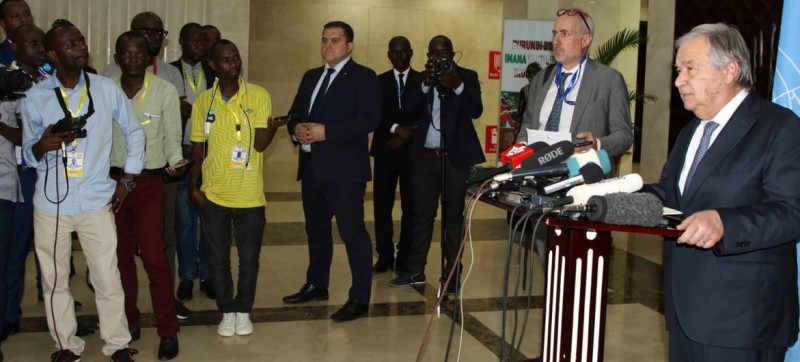UN/Penangnini Toure UN Secretary-General António Guterres speaks to reporters at a press conference in Bujumbura, Burundi.
“Everyone must put an end to hate speech, work to restore trust, and refrain from any action that could undermine the progress made for peace” in DRC, UN Secretary-General António Guterres said, on the eve of the high-level meeting of the Regional Oversight Mechanism of the Peace, Security and Cooperation Framework for DR Congo and the region, which opens on 6 May in the capital, Bujumbura.
Tweet URL
“I renew my call for de-escalation…and restraint,” he added.
With a focus on ending recurring cycles of violence in DRC and resolving conflict, tackling instability, and building sustainable peace in the region, the high-level meeting will review progress and challenges on implementing the Framework agreement, signed in Ethiopia in 2013, including by the guarantor institutions: the UN, African Union, International Conference on the Great Lakes Region (ICGLR), and the Southern African Development Community (SADC).
Noting Burundi’s national progress in accelerating the country’s development and economic growth, he said much remains to be done to ensure that efforts consider the needs of the most vulnerable populations and urged donors and the international community to support the Burundian authorities in this endeavour.
‘Significant progress’
Turning to Burundi’s “positive role” in the region and the forthcoming regional meeting, he commended nations that are implementing the Framework agreement, in light of “significant progress” in economic cooperation and integration.
But, the current crisis in the region underscores the need to redouble efforts to fully implement the commitments of the Framework agreement, he said.
This will require a collective political will to fully implement all elements of the agreement to address the root causes of instability, break the vicious circle of conflict in the region, and put an end to the plight of populations, who have suffered only too much, especially in DRC, the UN chief said, adding that his Special Envoy for the Great Lakes Region and the UN mission in the country (MONUSCO) will continue to support ongoing efforts.
“All international partners must do the same and contribute to strengthening technical and financial support and work for peace and stability in the DRC and the region,” he said.
Crisis in Sudan
With regard to the restive situation in Sudan, where rival military groups have been fighting since 15 April, he said the violence poses a threat to not only the Sudanese people, but to the security landscape in the Sahel and East Africa.
“The country is facing a humanitarian catastrophe,” he said, noting that more than 100,000 people have fled and as many as 800,000 people could leave Sudan in the coming days and weeks.
In addition, he said, millions of Sudanese are trapped by fighting and face growing food insecurity.

Mohamed Khalil The Al-Imam Al-Kadhim School in Al-Geneina City, West Darfur state, which had been serving as an internally displaced persons (IDP) shelter, was burned to the ground amidst the ongoing crisis in Sudan.
‘Fighting must stop’
“The fighting must stop immediately, before this conflict turns into a civil war that could destroy the country and upend the region for years to come,” he said, stating that all parties must de-escalate tensions, come to the negotiating table, and agree on a stable and lasting ceasefire, with the interests of the Sudanese people at the forefront.
“A return to peace and civilian rule is crucial, and these objectives are at the heart of our exchanges with the parties to the conflict,” he said, emphasizing that the UN is working closely with the African Union and the Intergovernmental Authority on Development (IGAD).
“Safe and unhindered humanitarian access must be guaranteed, so that aid can be immediately distributed to those in need,” he stressed.
Civilian populations and infrastructure must be protected, and humanitarian personnel must be respected, he said, calling on the international community to support the Sudanese people in their quest for peace and a return to a transition to civilian rule.




Comments are closed.